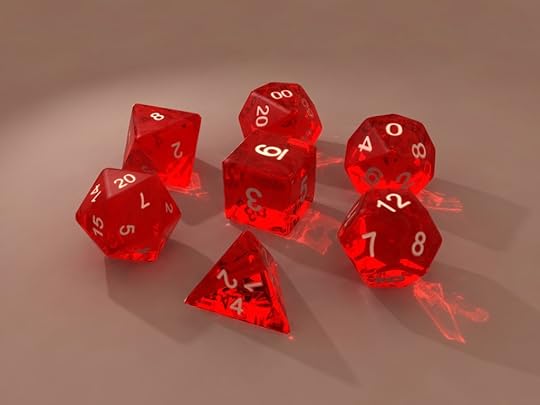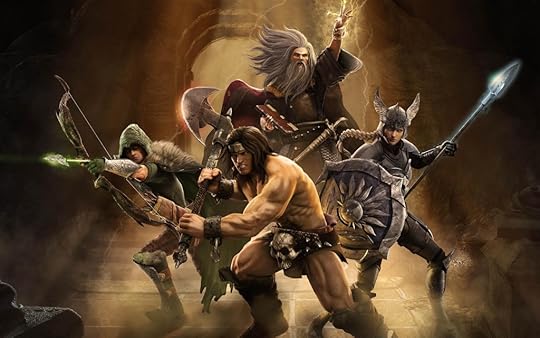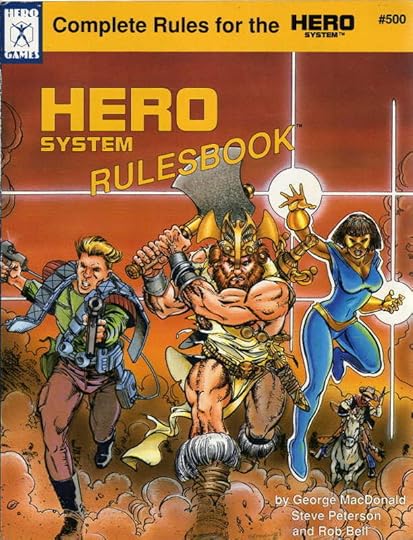Writing Novels and Tabletop RPGs; Lone wolf and pack storytelling
WAAAAY back in the dark ages of 1982, I was invited over to a fellow high school freshman’s house so that he could introduce me to this thing called Dungeons and Dragons. I was intrigued by the title and accepted the invitation, expecting something along the lines of a board game similar to Risk or Axis and Allies.
Yeah. It wasn’t that. It wasn’t that at all.
 My first addiction
My first addictionIt started with him showing me a handful of these little plastic dice in all these different and odd shapes. Twenty sided dice, twelve sided dice, little pyramid shaped four-siders; he held them out to me like a crack dealer holding out a pile of rocks and saying, “First one’s free, kid.” The metaphor was more apt than I realized at the time.
Then, he said I needed to create a character. I was baffled. See, even then I was writing and telling stories. You say ‘create a character’ to a writer and immediately they will wonder if it’s an antagonist, protagonist, or supporting character. What genre of story? What length? How deep of a history do I need to give this character and so on. When I expressed all of this by giving him a befuddled look and a grunted, “Huh?”, he explained; In the realm of tabletop role-playing games, the players provide the protagonists- the characters -and the referee (often called a Dungeonmaster or Gamemaster) provides a setting and situation that the characters have to deal with. The players have characters with skills and attributes suitable
 We’ve come for the all you can eat buffet!
We’ve come for the all you can eat buffet!to the setting. The players decide on the type of personality the characters they have created will have and then they respond to the situation the Gamemaster (GM) presents them with as the characters logically would. The GM- who is in the role of the antagonists -responds to the characters actions and then the characters react to that and so on and so on until the situation is resolved. Since it is a game and wouldn’t be so without the risk of objective failure, there are rules and game mechanics that oversee an action’s level of success. Beyond that, though, tabletop RPGs are really just another storytelling medium- cooperative storytelling, as it were (Okay, his explanation was really just, “man, shut up and trust me,” but I inferred the rest).
 HERO System 4th Edition. Best RPG rules system ever in my opinion.
HERO System 4th Edition. Best RPG rules system ever in my opinion.I took the crack-dice in hand and was immediately addicted. In the thirty plus years since then, I’ve played thousands of hours of these games in a variety of gaming systems and met some of the best friends that I’ve ever had. I’ve taken players on adventures across dragon infested fantasy landscapes, into deep space on faster than light starships, into modern cities filled with the walking dead, across the gulfs of time with caped and cowled superheroes, against mythological horrors in a modern world, into the 1930s where they raced against time to defeat the Rocket Nazis on the Orient Express, and into an old west where magic and monsters were very real. I’ve recreated settings from my players’ favorite media franchises and taken them along on adventures beside their favorite book/television/movie characters. I say I’ve ‘taken’ players because as soon as I could, I got my Gamemaster chops and started creating- started writing- adventures for my friends and players.
Why, you say? If writing was your first passion and your first love, why not turn those ideas into books that have at least a chance of lining your pockets and reaching way more people than the four to six at your gaming table? The answer to that lies in two words; instant gratification.
I could spend a few months writing a book and then (back then at least) I could spend a few more months submitting it to publishers and agents where it might (never did) get picked up and then make it onto a book store shelf where it might/maybe get bought and read. Odds are good
 I don’t know these folks, but they look like they’re enjoying themselves.
I don’t know these folks, but they look like they’re enjoying themselves.I would never know whether or not anyone enjoyed what I’d spent so much time working on. Alternatively, I could spend a month creating a RPG Campaign and then- once a week or so -see the looks on my players faces as they enjoyed the fruits of my labor. I got to hear them laugh, see the surprise or revulsion in their eyes, and watch as they were pulled out of their world of everyday banality and into the one that I had created for them where they were the heroes, the people that mattered.
I don’t know many novelists that can say they got to see all that as people read their books.
These days, my gaming life is pretty much behind me. Thanks to Amazon and the opportunities in self-publishing, I can take all those ideas and plots that I established at the gaming table and write the books that they could have been. They won’t be the same stories that were told over clattering dice and pizza, but the basic premises will be the same. In fact, my current trilogy is the setting I created for a Savage Worlds campaign that I ran for my most recent group. The story isn’t nearly the same, but there’s enough of it there that I know the people who were at that table will get a smile as they read them.
The point? Only this; stories and the means to tell them are everywhere and we shouldn’t be too quick to judge one medium over another. Fantasy football leagues are role-playing games for people that dream of owning NFL teams. The vast majority will never get to trade players and negotiate contracts any more than the girl that plays a Sorceress in a D&D game will get to throw a real fireball, but each of those experiences carries some sense of comfort and escape for the player. As creators. we should not underestimate the value of different storytelling mediums or the potential for inspiration when other people start weighing in on the seeds of your ideas. We are all characters in our own story, reacting and choosing to the roll of circumstance’s dice. Gaming just seems like a natural extension of that.
Thanks for reading.
Share and Enjoy
• Facebook • Twitter • Add to favorites • Email
C. Steven Manley's Blog
- C. Steven Manley's profile
- 36 followers



